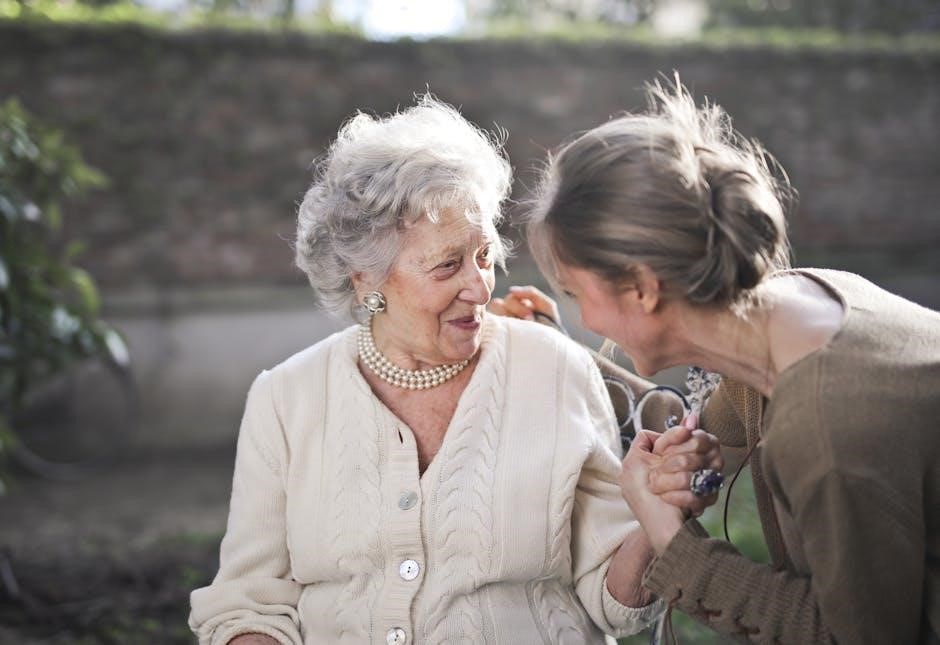Preparing for an aged care interview requires understanding key topics and common questions. This guide provides insights into person-centered care, scenario-based queries, and essential skills, helping you excel in your interview.
Overview of the Importance of Preparation
Preparation is crucial for aged care interviews, as it builds confidence and helps candidates showcase their skills effectively. Understanding common questions and topics ensures readiness for diverse scenarios, from person-centered care to emergency situations. Researching the facility and practicing responses highlights dedication and understanding of the role. Preparation not only demonstrates professionalism but also allows candidates to articulate their values and experiences aligning with the organization’s ethos, ultimately positioning them as ideal candidates for aged care roles.
Key Topics Covered in Aged Care Interviews
Aged care interviews cover a range of critical topics, including person-centered care, handling dementia patients, and managing emergencies. Candidates are also assessed on their communication skills, ability to adhere to policies, and understanding of infection control. Additionally, interviews explore an applicant’s empathy, relevant experience, and how they handle challenging situations. These topics reflect the multifaceted nature of aged care work, ensuring that candidates are well-rounded and capable of providing compassionate, high-quality support to residents.

Understanding the Role in Aged Care
Aged care roles involve providing compassionate support to elderly individuals, focusing on their physical, emotional, and social needs. It requires empathy, strong communication, and a commitment to improving quality of life while respecting individual preferences and dignity.
What is Person-Centered Care in Aged Care?
Person-centered care in aged care emphasizes respecting and valuing each individual’s uniqueness, ensuring their dignity and quality of life are maintained. It involves tailoring support to meet personal preferences, needs, and values, fostering a sense of control and independence. This approach prioritizes the resident’s voice in decision-making, creating a caring environment that honors their autonomy and lifestyle choices. Understanding and implementing person-centered care is a cornerstone of aged care roles and a frequent topic in interviews, as it reflects the sector’s commitment to compassionate and holistic support.
Common Aged Care Interview Questions
Common aged care interview questions focus on your ability to provide compassionate and personalized support. Examples include: “How would you handle a resident with dementia?” or “Describe a time you supported someone’s emotional needs.” Employers also ask about your understanding of person-centered care and how you ensure residents’ dignity. Additionally, scenario-based questions like managing emergencies or conflicts may arise. Prepare by reflecting on your experiences and aligning your responses with the core values of aged care, such as empathy, respect, and a commitment to improving quality of life.
Key Qualifications and Skills for Aged Care Roles
Essential qualifications include certifications in aged care, first aid, and infection control. Skills like empathy, communication, and physical stamina are crucial for providing quality, person-centered support to residents.
Essential Skills and Qualities for Aged Care Workers
Aged care workers require empathy, patience, and strong communication skills to connect with residents. Physical stamina is necessary for assisting with daily tasks. Emotional resilience helps manage challenging situations, while a person-centered approach ensures dignity and comfort. Time management and teamwork are also vital for providing effective care. These qualities and skills are frequently highlighted in aged care interviews, showcasing a candidate’s ability to deliver compassionate and professional support.
Physical and Emotional Demands of the Job
Aged care work requires both physical stamina and emotional resilience. Tasks like lifting, transferring, and assisting residents demand physical strength. Emotionally, workers must cope with challenging behaviors, such as dementia-related agitation, and provide comfort during end-of-life care. The role also involves long hours, repetitive tasks, and exposure to stressful situations. Resilience and adaptability are crucial to managing these demands effectively while maintaining compassion and professionalism.
Relevant Experience Required for Aged Care Roles
Relevant experience in aged care often includes hands-on involvement in personal care, such as assisting with daily activities, mobility support, and providing emotional comfort. Employers value experience in dementia care, wound management, and medication assistance. Prior roles in healthcare or volunteering with the elderly are advantageous. Demonstrating adaptability, patience, and empathy is crucial. Formal qualifications, like a Certificate III in Aged Care, are often required. Highlighting specific skills, such as communication and problem-solving, can strengthen your candidacy.

Scenario-Based Questions in Aged Care Interviews
Scenario-based questions assess your ability to handle real-life situations, such as managing dementia patients or emergencies. They evaluate your practical skills and emotional intelligence in care settings.
Handling Dementia Patients
Handling dementia patients requires empathy, patience, and a person-centered approach. Be prepared to discuss strategies like validation therapy or redirection to manage challenging behaviors. Emphasize your ability to remain calm and understanding, ensuring the patient’s dignity and safety. Highlight experiences where you’ve adapted care to meet individual needs, such as creating familiar routines or using memory aids. Showcase how you balance emotional support with practical care, ensuring a compassionate and effective response to their unique requirements.
Managing Emergency Situations
Managing emergency situations in aged care requires quick thinking and calm decision-making. Discuss your ability to assess risks, prioritize safety, and follow facility protocols. Highlight experiences where you’ve handled emergencies like falls or medical crises, emphasizing clear communication and teamwork. Showcase your knowledge of first aid, emergency response plans, and how you ensure resident well-being. Be prepared to provide examples of staying composed under pressure and effectively coordinating care during critical moments to demonstrate your problem-solving skills.
Communication Strategies with Residents
Effective communication is crucial when interacting with aged care residents. Emphasize the importance of clear, respectful, and patient dialogue, adapting your approach to meet individual needs. Discuss strategies such as active listening, using simple language, and non-verbal cues like eye contact and gentle gestures. Highlight how you ensure residents feel heard and valued, especially those with cognitive or hearing impairments. Share examples of how you’ve tailored communication to accommodate diverse backgrounds or disabilities, demonstrating empathy and a person-centered approach to build trust and understanding.

Behavioral and Situational Questions
Behavioral questions focus on past experiences, while situational ones explore hypothetical challenges. These assess your problem-solving skills, empathy, and ability to handle aged care scenarios effectively.
Examples of Behavioral Questions
Behavioral questions in aged care interviews focus on your past experiences and how you handled specific situations. Examples include:
“Describe a time you supported a resident with dementia.” or
“How did you handle a difficult situation with a family member?” These questions assess your problem-solving skills, empathy, and ability to manage challenging scenarios. Prepare by reflecting on real-life examples and using the STAR method (Situation, Task, Action, Result) to structure your responses. This approach demonstrates your ability to think critically and care compassionately.
Situational Questions and How to Answer Them
Situational questions in aged care interviews present hypothetical scenarios to gauge your problem-solving skills. For example, “How would you handle a resident who refuses medication?” or “What would you do if a resident wandered away?” To answer effectively, remain calm, prioritize safety, and demonstrate empathy. Use the STAR method: describe the Situation, your Task, the Action you took, and the Result. Show confidence and alignment with aged care values, such as respect and person-centered care, to convey your readiness for real-world challenges.
Past Experiences and Learning Opportunities
Reflecting on past experiences is crucial in aged care interviews, as it demonstrates your ability to learn and grow. Highlight specific skills, such as patience, communication, or empathy, developed in previous roles. For example, describe a situation where you supported a resident with unique needs, emphasizing how it deepened your understanding of person-centered care. Discuss how these experiences have prepared you to handle challenges in aged care, showcasing your problem-solving skills and emotional resilience. Present your experiences in a structured, clear manner to illustrate your suitability for the role.
Technical Questions About Aged Care Policies and Procedures
Understanding aged care policies and procedures is vital. Be prepared to discuss infection control, safety protocols, and medication management, demonstrating how these ensure quality care and compliance.
Understanding Aged Care Policies
Understanding aged care policies is crucial for interview success. These policies ensure quality care and compliance with legal standards. Review health and safety protocols, privacy laws, and ethical guidelines. Familiarize yourself with medication management procedures and infection control measures. Be ready to discuss how these policies promote resident well-being and dignity. Demonstrating knowledge of these areas shows your commitment to professional standards and resident-centered care. This preparation will help you answer technical questions confidently and effectively during your interview.
Infection Control and Safety Protocols
Infection control and safety protocols are vital in aged care to protect residents and staff. Standard precautions, such as hand hygiene and PPE use, are essential. Understand proper waste management and cleaning procedures to prevent outbreaks. Familiarize yourself with emergency response plans and evacuation protocols. Knowledge of these practices demonstrates your commitment to maintaining a safe environment. Be prepared to discuss how you would implement these protocols in daily tasks, ensuring resident well-being and dignity. This is a critical area of focus in aged care interviews.
Medication Management in Aged Care
Medication management is a critical aspect of aged care, ensuring residents receive the right medications safely and effectively. Accurately administering, monitoring, and documenting medication is essential. Understanding common medications, potential side effects, and interactions is vital. Implementing safety protocols, such as using medication charts and electronic systems, minimizes errors. Be prepared to discuss strategies for managing complex medication regimens and handling situations where residents refuse medication. Clear communication with healthcare providers and family members is also key to effective medication management in aged care settings.

Preparing for the Aged Care Interview
Research the facility, practice common questions, and review policies. Showcase empathy, highlight relevant skills, and demonstrate a clear understanding of the role to stand out.
Researching the Aged Care Facility
Researching the aged care facility is crucial for a successful interview. Understanding their mission, values, and services helps align your skills and experiences with their needs. Familiarize yourself with their policies, such as infection control and medication management, to demonstrate your readiness. Knowing their specific programs, like dementia care or palliative services, shows genuine interest. This preparation allows you to ask informed questions and highlight how your qualifications match their organizational goals, making you a standout candidate.
Practicing Common Interview Responses
Practicing common interview responses is essential for aged care roles. Review frequently asked questions, such as those on person-centered care and handling dementia patients. Craft concise, honest answers using the STAR method to structure your experiences. Rehearse scenarios like managing emergencies or communicating with residents. Use sample answers as guides but personalize them with your experiences. Recording yourself or conducting mock interviews can enhance confidence and clarity, ensuring you articulate your skills and compassion effectively during the real interview.
Non-Verbal Communication Tips
Non-verbal cues are vital in aged care interviews. Maintain eye contact to show attentiveness and sincerity. Smile naturally to convey warmth and empathy. Use open and relaxed body language, such as uncrossing your arms, to appear approachable. Nodding and leaning slightly forward can demonstrate active listening. Avoid fidgeting or distractions, as they may suggest lack of focus. Mirroring the interviewer’s tone and pace can build rapport. Ensure your posture reflects confidence and professionalism, as non-verbal signals significantly impact first impressions in aged care roles.

After the Interview
After the interview, follow up with a thank-you note and assess your performance. Reflect on strengths and areas for improvement to refine future responses.
Following Up with the Employer
Sending a thank-you note within 24 hours after the interview is a professional courtesy that leaves a positive impression. Reiterate your interest in the role and appreciation for the opportunity. If no decision timeline was provided, politely inquire about when you might expect feedback. This proactive approach demonstrates your enthusiasm and helps keep you top of mind for the employer. Additionally, use this time to reflect on the interview and identify areas for improvement, ensuring you are better prepared for future opportunities in aged care.
Evaluating Your Performance
Evaluating your performance after an aged care interview helps identify strengths and areas for improvement. Reflect on how confidently you articulated your skills and experiences. Consider whether you effectively demonstrated empathy and understanding of person-centered care. Assess your responses to scenario-based questions, ensuring they showcased practical problem-solving skills. Additionally, evaluate your non-verbal communication and overall professionalism. Use this self-assessment to refine your approach for future interviews, ensuring you align with the values and expectations of aged care employers. This reflective process is crucial for continuous improvement and securing a fulfilling role in the aged care sector.

Additional Tips for Success
Demonstrate empathy, showcase relevant skills, and stay informed about industry trends to stand out in aged care interviews and secure a fulfilling role in the sector.
Showing Empathy and Compassion
Empathy is a cornerstone of aged care, as it allows you to understand and connect with residents’ emotional and physical needs. Demonstrating compassion during interviews by sharing personal experiences or stories highlights your ability to provide person-centered care. Showcasing cultural sensitivity and active listening skills further emphasizes your commitment to delivering thoughtful and respectful support. This approach not only builds trust but also aligns with the values of aged care facilities, making you a standout candidate for the role.
Highlighting Relevant Skills and Experiences
To excel in aged care interviews, emphasize your relevant skills and experiences. Prepare examples that demonstrate your ability to provide person-centered care, such as assisting with daily tasks or supporting emotional well-being. Highlight communication skills, patience, and adaptability, as these are crucial in aged care roles. Share specific instances from your past roles that showcase your ability to work with diverse needs and preferences. Mention any certifications or training that align with the job requirements, ensuring your qualifications and experiences match the expectations of the aged care facility.
Staying Informed About Industry Trends
Staying informed about industry trends is vital for success in aged care. Research advancements in care practices, policy updates, and technological innovations. Familiarize yourself with emerging topics like dementia care strategies, infection control protocols, and digital health tools. Engage with industry newsletters, webinars, and professional networks to stay updated. Understanding current trends demonstrates your commitment to delivering high-quality care and positions you as a proactive candidate during interviews. This knowledge also helps you address modern challenges and opportunities in the aged care sector effectively.
Mastering aged care interview questions and answers empowers you to showcase your skills and passion, ensuring confidence and success in your career journey, making a meaningful difference.
Final Thoughts on Aged Care Interviews
Preparation is key to acing aged care interviews. Focus on showcasing empathy, understanding of person-centered care, and your ability to handle challenging situations. Be ready for behavioral, scenario-based, and technical questions. Highlight your relevant skills and experiences, and demonstrate how you align with the facility’s values. Researching the organization and practicing responses will boost your confidence. Remember, aged care is about compassion and making a difference in residents’ lives. By being authentic and well-prepared, you can stand out as an ideal candidate for the role.
Resources for Further Preparation
Enhance your interview preparation with comprehensive guides like “Aged Care Questions and Answers.pdf,” offering insights into common questions and sample responses. Websites such as How2Become.com provide detailed tips and practice materials tailored for aged care roles; Additionally, industry-specific books and online courses can deepen your understanding of person-centered care and scenario-based challenges. Utilize these resources to refine your answers, practice non-verbal communication, and gain confidence in addressing technical and behavioral queries effectively.
